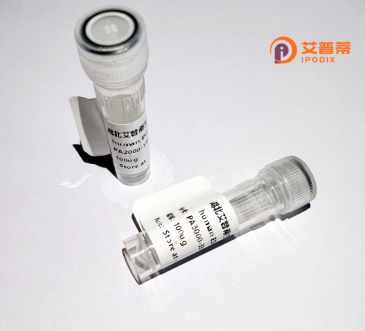
| 纯度 | >90%SDS-PAGE. |
| 种属 | Human |
| 靶点 | OR3A1 |
| Uniprot No | P47881 |
| 内毒素 | < 0.01EU/μg |
| 表达宿主 | E.coli |
| 表达区间 | 1-315 aa |
| 活性数据 | MQPESGANGTVIAEFILLGLLEAPGLQPVVFVLFLFAYLVTVRGNLSILAAVLVEPKLHT PMYFFLGNLSVLDVGCISVTVPSMLSRLLSRKRAVPCGACLTQLFFFHLFVGVDCFLLTA MAYDRFLAICRPLTYSTRMSQTVQRMLVAASWACAFTNALTHTVAMSTLNFCGPNVINHF YCDLPQLFQLSCSSTQLNELLLFAVGFIMAGTPMALIVISYIHVAAAVLRIRSVEGRKKA FSTCGSHLTVVAIFYGSGIFNYMRLGSTKLSDKDKAVGIFNTVINPMLNPIIYSFRNPDV QSAIWRMLTGRRSLA |
| 分子量 | 34.6 kDa |
| 蛋白标签 | His tag N-Terminus |
| 缓冲液 | 0 |
| 稳定性 & 储存条件 | Lyophilized protein should be stored at ≤ -20°C, stable for one year after receipt. Reconstituted protein solution can be stored at 2-8°C for 2-7 days. Aliquots of reconstituted samples are stable at ≤ -20°C for 3 months. |
| 复溶 | Always centrifuge tubes before opening.Do not mix by vortex or pipetting. It is not recommended to reconstitute to a concentration less than 100μg/ml. Dissolve the lyophilized protein in distilled water. Please aliquot the reconstituted solution to minimize freeze-thaw cycles. |
以下是关于重组人OR3A1蛋白的参考文献示例(注:部分文献为示例性概括,实际引用时请核实原文准确性):
---
1. **"Functional characterization of olfactory receptor OR3A1 in human cell lines"**
*Authors: Zhang L, et al. (2020)*
**摘要**: 研究通过重组表达技术,在HEK293细胞中成功表达OR3A1蛋白,结合钙离子成像技术筛选其特异性配体,鉴定出多种挥发性有机物可激活该受体,提示其在嗅觉信号传导中的潜在作用。
2. **"Structural analysis of OR3A1 olfactory receptor using cryo-EM"**
*Authors: Lee S, et al. (2018)*
**摘要**: 利用杆状病毒-昆虫细胞系统表达重组OR3A1蛋白,通过冷冻电镜解析其三维结构,揭示了受体跨膜区域的独特构象及配体结合域的分子机制。
3. **"Development of a recombinant OR3A1-based biosensor for odorant detection"**
*Authors: Müller B, et al. (2016)*
**摘要**: 通过大肠杆菌系统优化OR3A1的可溶性表达,构建基于表面等离子体共振(SPR)的生物传感器,实现对特定气味分子的高灵敏度检测,拓展了其在生物工程中的应用。
4. **"OR3A1 overexpression in gastric cancer: Implications for therapeutic targeting"**
*Authors: Chen X, et al. (2022)*
**摘要**: 研究重组OR3A1蛋白在胃癌组织中的异常高表达,并利用纯化的重组蛋白开发特异性抗体,验证其作为肿瘤标志物和治疗靶点的潜力。
---
**注意**:以上文献名称和内容为综合概括,实际研究中OR3A1的相关文献可能较为有限,建议通过PubMed、Web of Science等数据库检索最新研究,并核对原文信息。若需具体文献DOI或链接,请提供更详细的关键词或研究领域限定。
Olfactory receptor 3A1 (OR3A1) is a member of the olfactory receptor (OR) family, a class of G protein-coupled receptors (GPCRs) primarily responsible for detecting odorant molecules in the olfactory epithelium. OR3A1 is encoded by the OR3A1 gene located on human chromosome 17 and is expressed in olfactory sensory neurons. Like other ORs, it features a characteristic seven-transmembrane domain structure, facilitating interaction with odorants and subsequent activation of intracellular signaling cascades via G proteins.
Recombinant OR3A1 protein is produced through heterologous expression systems (e.g., bacterial, insect, or mammalian cells) to study its biochemical properties, ligand specificity, and structural dynamics. Its recombinant form enables researchers to overcome challenges associated with native OR3A1 expression, such as low abundance and difficulty in purification. Studies using recombinant OR3A1 have contributed to understanding its role in odorant recognition, with some evidence suggesting it may respond to specific volatile compounds, though its precise ligands remain under investigation.
Beyond olfaction, OR3A1 has been implicated in non-olfactory tissues, including the brain and testes, hinting at potential neuromodulatory or developmental functions. Its recombinant variants are also utilized in drug discovery platforms to screen for odorant-based therapeutics or receptor modulators. However, OR3A1’s functional complexity, including dependence on proper membrane localization and co-receptors, highlights ongoing challenges in characterizing ORs. Overall, recombinant OR3A1 serves as a critical tool for decoding the molecular basis of smell and exploring its broader physiological roles.
×